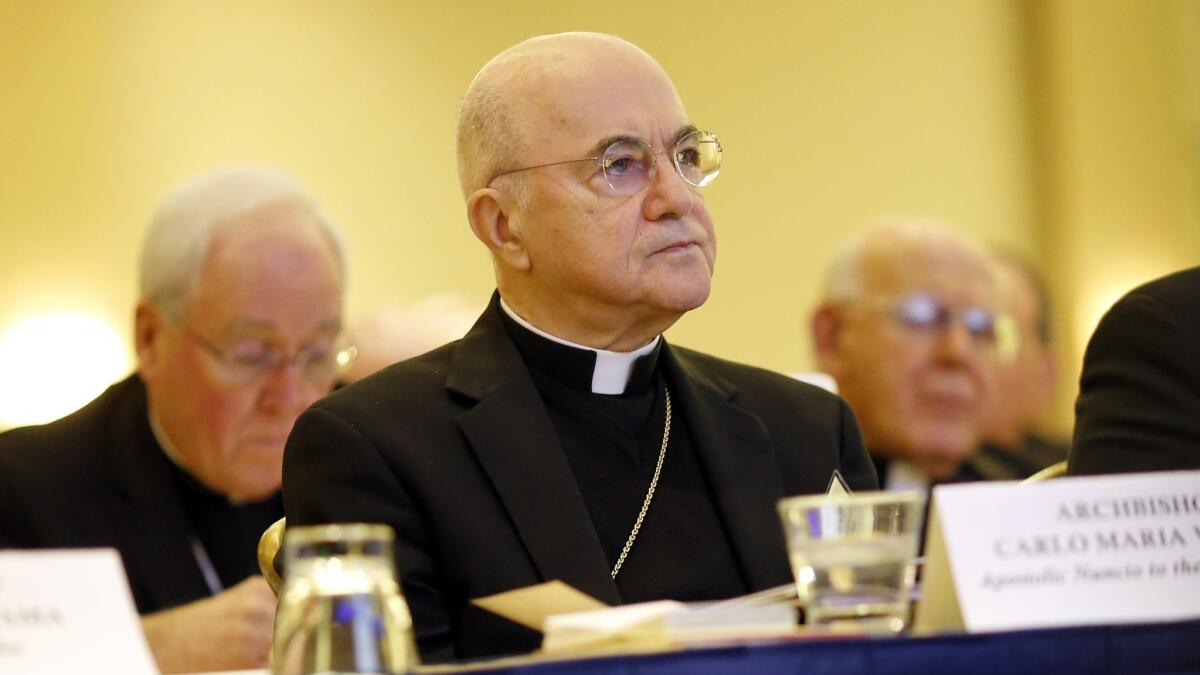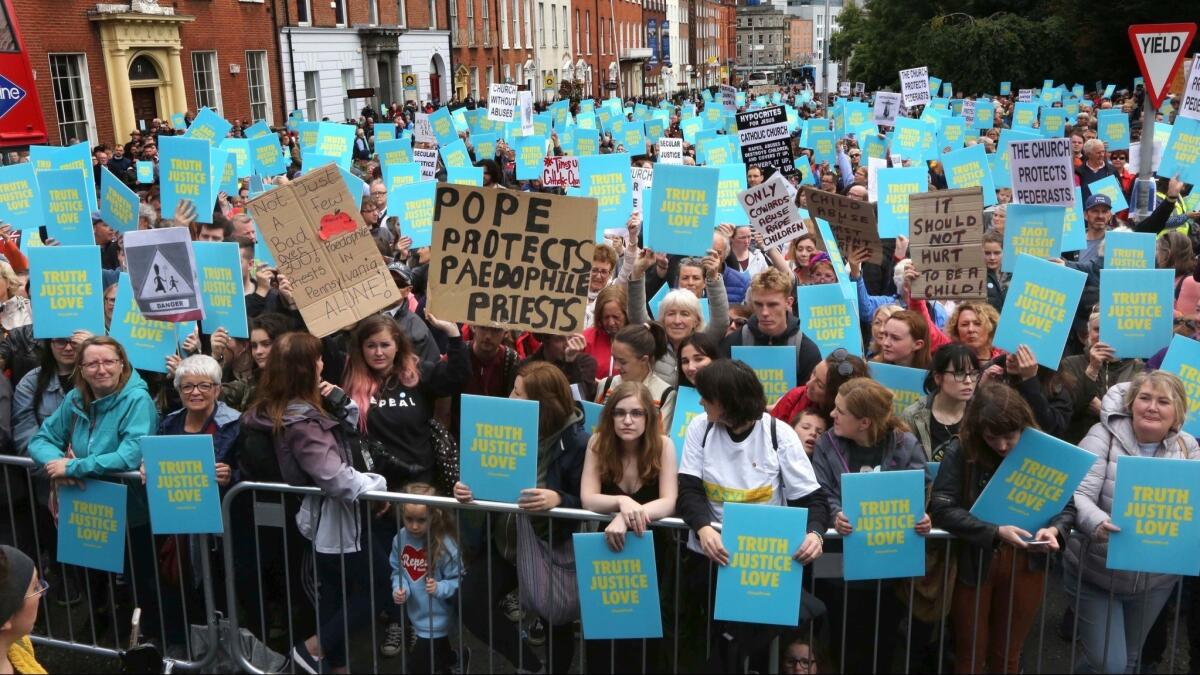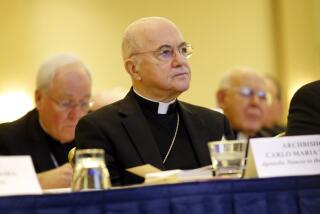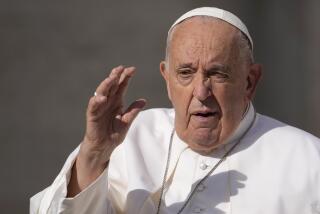Who is Carlo Maria Vigano, the man accusing Pope Francis of covering up sex abuse?

- Share via
The Roman Catholic Church went into crisis mode this week after a Vatican official published an 11-page letter alleging that Pope Francis and U.S. Catholic leaders covered up sexual abuse by an American cardinal.
In the unusually detailed and direct letter, Archbishop Carlo Maria Vigano, the former Vatican ambassador to the U.S., made unsubstantiated claims that Francis and several American cardinals and archbishops had teamed up over the years to protect Theodore McCarrick, who as a cardinal was one of the most powerful figures in the church.
Vigano, who released the letter as the pope was visiting Ireland, blamed church leaders for protecting a widespread “homosexual current” in the Vatican and said Francis must resign. He also said church leaders had a “pro-gay ideology” that ran counter to long-standing church prohibitions against homosexual acts.
But church experts say the letter’s significance may be less about those allegations than about power struggles within the church hierarchy.
Francis has set a more liberal tone by meeting with gay people and expressing more tolerance for homosexuality than any pope in history, though still hewing to the church’s prohibition on same-sex marriage. Vigano, who was the Vatican’s ambassador to the U.S. until 2016, is part of a more conservative wing of the church that has protested Francis’ leadership, especially on issues of sexuality.
Read a translation of the 11-page letter by Archbishop Carlo Maria Vigano »
“This letter has everything to do with factions in the church that are vying for power and influence,” said Massimo Faggioli, a professor of theology at Villanova University who studies the Vatican. “You have a convergence of interests that is making this a huge mess in the U.S. Catholic Church.”
Vigano’s long and intimate access to the inner workings of the papacy makes the letter difficult for the pope to brush aside.
Born into a rich Italian family, Vigano eventually became an archbishop in 1992 at the behest of Pope John Paul II. From there, he ascended the church’s ranks, becoming a diplomat for the Vatican, the secretary of the governorate of Vatican City and the Vatican’s ambassador to the U.S.

But throughout his rise, he clashed with church officials — including Pope Benedict XVI and Francis — over whether Vatican leaders were supportive of him, his attempts to change church governance and his views of homosexuality in the church.
He has said that by not cracking down on homosexuality within the church, the leadership has contributed to the problem of pedophile priests — a contention that is roundly disputed by liberal Catholic leaders and victims’ advocates who say sexual orientation has no bearing on whether somebody commits abuse.
In widely publicized leaked church documents in 2012, Vigano was shown appealing to church leadership to discredit anonymously sourced articles in the Italian press criticizing his performance and role in the Vatican. The documents — dubbed VatiLeaks — showed that the leaders refused to defend him.
The documents also showed that Vigano was desperate to not be transferred to the diplomatic position in Washington and protested to his superiors, including Benedict’s second-in-command, Cardinal Tarcisio Bertone.
Vigano said in the leaked letters that he was being punished for uncovering corruption in the Vatican. Bertone is among the church leaders Vigano named in his recent letter as co-conspirators in Vatican cover-ups.
In 2015, when Francis visited Washington, Philadelphia and New York, Vigano played a key role in one of the most controversial moments of the trip.
He arranged for the pope — who had until then received widely positive news coverage for saying it was not his place to judge gay people — to meet Kim Davis, a Kentucky county clerk who had become embroiled in national controversy over her refusal to give marriage certificates to gay couples. Vatican insiders said the pope, who shook hands and took photographs with many people during his visit, did not fully understand who Davis was when he posed with her at the ambassador’s residence.
The incident, which overtook otherwise glowing reports on the pope’s U.S. visit, was blamed internally on Vigano and said to be one of the reasons Francis did not ask him to stay in his post upon reaching the retirement age of 75. Catholic officials frequently stay in posts beyond retirement age at the request of the pope.
In his letter released over the weekend, Vigano wrote that Francis and Benedict were aware of sexual abuse by McCarrick, the former cardinal who led churches in the Washington region from 2001 to 2006.
McCarrick resigned in July and was stripped of his title of cardinal after U.S. news outlets reported that he had abused seminarians. Vigano also said that other Catholic figures, including Cardinal Donald Wuerl, the archbishop of Washington, were aware of the abuse.
Wuerl said through a spokesman that he was never told that the Vatican had barred McCarrick from celebrating Mass.
Reaction to the letter varied.
In a statement released Monday, Cardinal Daniel DiNardo, the president of the U.S. Conference of Catholic Bishops, said the allegations must be investigated.
“The questions raised deserve answers that are conclusive and based on evidence,” DiNardo, the archbishop of Galveston-Houston, said. “Without those answers, innocent men may be tainted by false accusation and the guilty may be left to repeat sins of the past.”
Also named in the letter was Cardinal Joseph Tobin of Newark, N.J., who said in a statement that the allegations had “factual errors, innuendo and fearful ideology.” Tobin said there needed to be “scrutiny of the claims” to “help establish the truth.”
Archbishop Charles Chaput of Philadelphia, a leader among conservative Catholics, issued a statement praising Vigano’s “integrity” but said he could not comment on the letter because it had details “beyond his personal experience.”
Bishop Joseph Strickland of the Diocese of Tyler, Texas, went further. In a letter to church members, he said that the details in Vigano’s letter “are still allegations but as your shepherd I find them to be credible.”
Though the U.S. church indicated it will investigate, it’s unclear what the Vatican will do.
When asked about the allegations after he departed Ireland on Sunday, Francis refused to address them.
“I will not say a single word on this,” he said. “I think this statement speaks for itself, and you have the sufficient journalistic capacity to draw conclusions.”
Twitter: @jaweedkaleem
More to Read
Sign up for Essential California
The most important California stories and recommendations in your inbox every morning.
You may occasionally receive promotional content from the Los Angeles Times.











